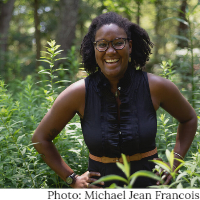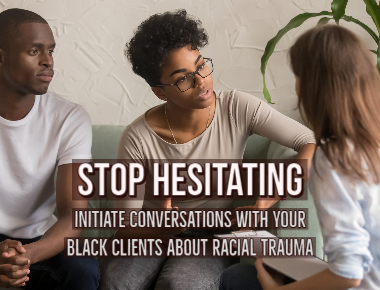Stop Hesitating
A quick, highly directive guide to initiating conversations with your Black clients about George Floyd, Breonna Taylor, Tony McDade, other lives lost, Minnesota, Louisville, and racial trauma

Elizabeth McCorvey, MSW, LCSW, has created a one-page guide for white therapists that helps engage Black and minority clients about racism, the Black Lives Matter Movement, and racial trauma in general.
Not sure how to start? Pick a phrase, any phrase, and tailor to your liking:
No matter your personal opinion, or how much you may disagree with what they say to you, say these things and be careful not to talk too much because you feel awkward:
And then validate, validate, validate. Do not talk about your own personal experiences with racism unless invited or unless you have asked permission.
Not sure how to start? Pick a phrase, any phrase, and tailor to your liking:
- “I’ve been thinking about you lately with everything that has been going on in Minnesota and the racial trauma you might be experiencing. Would you like some space to process?” They may tell you no! Own your discomfort. Sit with it. Move on.
- “We don’t usually talk about race in our sessions, but I’ve been wondering how the news has been impacting you lately.” (Sidenote - if you’re a white therapist and you’ve never brought up race in your sessions, you cannot possibly be doing enough of your own work. Period. I’m not talking about if you brought it up once and they responded by closing the door, I mean if you’ve never once acknowledged your white privilege in your sessions. It’s in the room whether you have the gumption to bring it up or not. Believe me, your Black clients noticed.)
- “I feel a little nervous bringing this up. I want to give you the space to talk about race and everything that has been happening in the news lately, and outside of our sessions, I'm committed to learning how. I’m not going to do this perfectly, but I don’t want to pretend this isn’t happening.”
- “I know that I am white/not of your race and can’t possibly understand what you might be going through. I want you to know that I am open to hearing anything you need to process right now.”
- “Would you like to talk about the protests in Minnesota? Please feel free to say no.” This might feel shocking for your client if you’ve never talked about race before. They might feel flustered. You might feel flustered. I promise you, if you’ve never talked about race with your client before, it is far more damaging to NOT talk about it than it is to stumble through a few awkward moments. I promise you.
No matter your personal opinion, or how much you may disagree with what they say to you, say these things and be careful not to talk too much because you feel awkward:
- “I hear you.” “I see you.” “I’m so sorry.”
- “I can’t begin to understand what this must be like for you.”
- “Would you like for me to bring this up again in future sessions? I won’t be hurt if you say no.”
- “Here are some options for how I can show up for you/support you. Let’s brainstorm together for what that might look like, and add to that list.”
And then validate, validate, validate. Do not talk about your own personal experiences with racism unless invited or unless you have asked permission.
Meet the Expert:

Elizabeth McCorvey, MSW, LCSW, is a psychotherapist living in Asheville, NC. She received her Bachelors in Social Work from the University of Kentucky and her Masters in Social Work from the University of Tennessee. She obtained her LCSW in 2017. Elizabeth owns a private practice called Unbridled Connections, LLC, where she works with adults using equine-assisted psychotherapy (therapy using horses!), and has an office where she sees clients (far fewer horses). She also works at University of North Carolina - Asheville in their Health and Counseling Department. Elizabeth specializes in working with adults who are minority-identified in some way, and works with people who are experiencing Racial Trauma. Elizabeth co-facilitates a training for Mental Health providers called "Are You Doing It Wrong?" to help therapists become better clinicians when working with their clients who are People of Color. In her spare time, Elizabeth plays the violin in a folk duo, drinks craft beer and watches a lot of Netflix.
Learn more about Elizabeth by clicking here.
Learn more about Elizabeth by clicking here.
Topic: Cultural, Social, & Racial Issues
Tags: Advice | Community | Cultural Diffferences | Culture | Race in therapy





